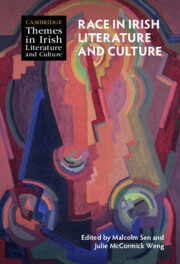Book contents
- Race in Irish Literature and Culture
- Cambridge Themes in Irish Literature and Culture
- Race in Irish Literature and Culture
- Copyright page
- Dedication
- Contents
- Figures
- Contributors
- Editors’ Note
- Introduction
- Chapter 1 “Our Heroic Ancestors”
- Chapter 2 Racializing Irish Historical Consciousness
- Chapter 3 Race, Minstrelsy, and the Irish Stage
- Chapter 4 Race and Irish Women’s Novels in the Long Nineteenth Century
- Chapter 5 Blackface Minstrelsy, Irish Modernism, and the Histories of Irish Whiteness
- Chapter 6 Joyce’s Racial Comedy
- Chapter 7 W. B. Yeats, the Irish Free State, and the Rhetoric of Race Suicide
- Chapter 8 “Ulster’s White Negroes”
- Chapter 9 Learning from Walcott
- Chapter 10 Race, Irishness, and Popular Culture in Australia
- Chapter 11 White Nationalism and Irish America
- Chapter 12 Diasporic Afterlives
- Chapter 13 “Dubh”
- Chapter 14 Split Selves and Double Consciousness in Recent Irish Fiction
- Chapter 15 Race, Place, and the Grounds of Irish Geopolitics
- Select Bibliography
- Index
Chapter 2 - Racializing Irish Historical Consciousness
Published online by Cambridge University Press: 04 January 2024
- Race in Irish Literature and Culture
- Cambridge Themes in Irish Literature and Culture
- Race in Irish Literature and Culture
- Copyright page
- Dedication
- Contents
- Figures
- Contributors
- Editors’ Note
- Introduction
- Chapter 1 “Our Heroic Ancestors”
- Chapter 2 Racializing Irish Historical Consciousness
- Chapter 3 Race, Minstrelsy, and the Irish Stage
- Chapter 4 Race and Irish Women’s Novels in the Long Nineteenth Century
- Chapter 5 Blackface Minstrelsy, Irish Modernism, and the Histories of Irish Whiteness
- Chapter 6 Joyce’s Racial Comedy
- Chapter 7 W. B. Yeats, the Irish Free State, and the Rhetoric of Race Suicide
- Chapter 8 “Ulster’s White Negroes”
- Chapter 9 Learning from Walcott
- Chapter 10 Race, Irishness, and Popular Culture in Australia
- Chapter 11 White Nationalism and Irish America
- Chapter 12 Diasporic Afterlives
- Chapter 13 “Dubh”
- Chapter 14 Split Selves and Double Consciousness in Recent Irish Fiction
- Chapter 15 Race, Place, and the Grounds of Irish Geopolitics
- Select Bibliography
- Index
Summary
This chapter traces the concept of an “Irish race” as it appeared and developed in historical writing. It opens with a brief survey of the legacy of medieval and early-modern tropes of otherness in English descriptions of the Irish population, as well as in vernacular Gaelic poetry that responded to colonization, and in antiquarian writings about national origins. It then charts the influences of enlightenment discourse on racial differences and the formulation of nineteenth century anthropological concepts of race. Distinctions between Anglo-Saxons and Celts, championed by eminent English historians, were inverted in popular Irish histories, in which ahistorical notions of a distinct “Irish race” were a marker for innate national uniqueness. Whereas racial prejudice was prevalent in Victorian political writing, Irish nationalist histories showed a fluid approach to race, which was used to forward claims for a distinguished ancient pedigree worthy of sovereignty and to foster a transnational bond with diaspora communities worldwide. Having played a prominent role in the Irish Revival through to the early years of independence, the language of race was practically expunged from Irish historiography in the mid-twentieth century, and yet the appeal of racial distinctiveness has not entirely vanished.
Keywords
- Type
- Chapter
- Information
- Race in Irish Literature and Culture , pp. 42 - 58Publisher: Cambridge University PressPrint publication year: 2024



